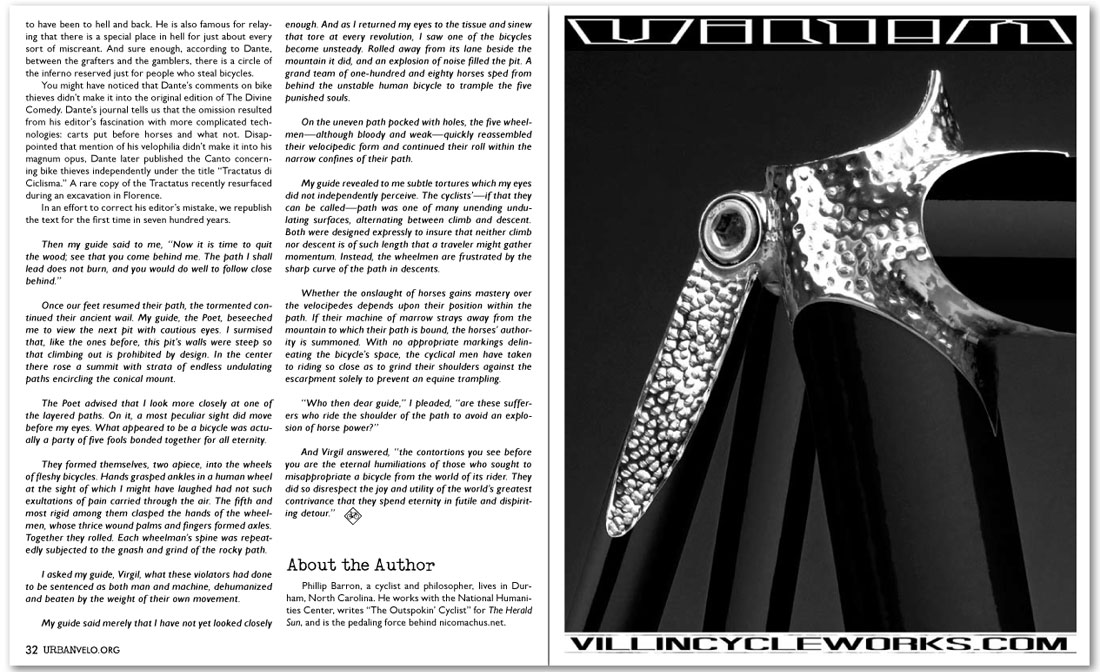to have been to hell and back. He is also famous for relaying that there is a special place in hell for just about every sort of miscreant. And sure enough, according to Dante, between the grafters and the gamblers, there is a circle of the inferno reserved just for people who steal bicycles.
You might have noticed that Dante’s comments on bike thieves didn’t make it into the original edition of The Divine Comedy. Dante’s journal tells us that the omission resulted from his editor’s fascination with more complicated technologies: carts put before horses and what not. Disappointed that mention of his velophilia didn’t make it into his magnum opus, Dante later published the Canto concerning bike thieves independently under the title “Tractatus di Ciclisma.” A rare copy of the Tractatus recently resurfaced during an excavation in Florence.
In an effort to correct his editor’s mistake, we republish the text for the first time in seven hundred years.
Then my guide said to me, “Now it is time to quit the wood; see that you come behind me. The path I shall lead does not burn, and you would do well to follow close behind.”
Once our feet resumed their path, the tormented continued their ancient wail. My guide, the Poet, beseeched me to view the next pit with cautious eyes. I surmised that, like the ones before, this pit’s walls were steep so that climbing out is prohibited by design. In the center there rose a summit with strata of endless undulating paths encircling the conical mount.
The Poet advised that I look more closely at one of the layered paths. On it, a most peculiar sight did move before my eyes. What appeared to be a bicycle was actually a party of five fools bonded together for all eternity.
They formed themselves, two apiece, into the wheels of fleshy bicycles. Hands grasped ankles in a human wheel at the sight of which I might have laughed had not such exultations of pain carried through the air. The fifth and most rigid among them clasped the hands of the wheel-men, whose thrice wound palms and fingers formed axles. Together they rolled. Each wheelman’s spine was repeatedly subjected to the gnash and grind of the rocky path.
I asked my guide, Virgil, what these violators had done to be sentenced as both man and machine, dehumanized and beaten by the weight of their own movement.
My guide said merely that I have not yet looked closely enough. And as I returned my eyes to the tissue and sinew that tore at every revolution, I saw one of the bicycles become unsteady. Rolled away from its lane beside the mountain it did, and an explosion of noise filled the pit. A grand team of one-hundred and eighty horses sped from behind the unstable human bicycle to trample the five punished souls.
On the uneven path pocked with holes, the five wheelmen—although bloody and weak—quickly reassembled their velocipedic form and continued their roll within the narrow confines of their path.
My guide revealed to me subtle tortures which my eyes did not independently perceive. The cyclists’—if that they can be called—path was one of many unending undulating surfaces, alternating between climb and descent. Both were designed expressly to insure that neither climb nor descent is of such length that a traveler might gather momentum. Instead, the wheelmen are frustrated by the sharp curve of the path in descents.
Whether the onslaught of horses gains mastery over the velocipedes depends upon their position within the path. If their machine of marrow strays away from the mountain to which their path is bound, the horses’ authority is summoned. With no appropriate markings delineating the bicycle’s space, the cyclical men have taken to riding so close as to grind their shoulders against the escarpment solely to prevent an equine trampling.
“Who then dear guide,” I pleaded, “are these sufferers who ride the shoulder of the path to avoid an explosion of horse power?”
And Virgil answered, “the contortions you see before you are the eternal humiliations of those who sought to misappropriate a bicycle from the world of its rider. They did so disrespect the joy and utility of the world’s greatest contrivance that they spend eternity in futile and dispiriting detour.”
